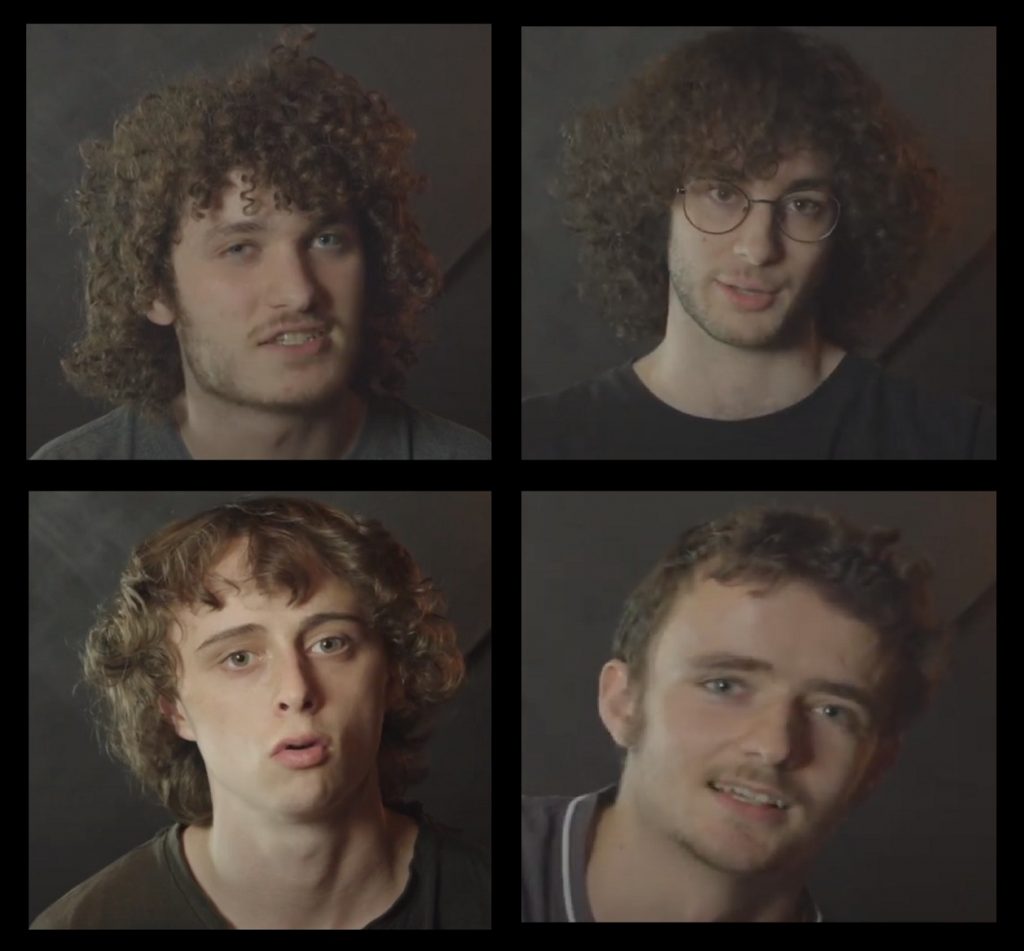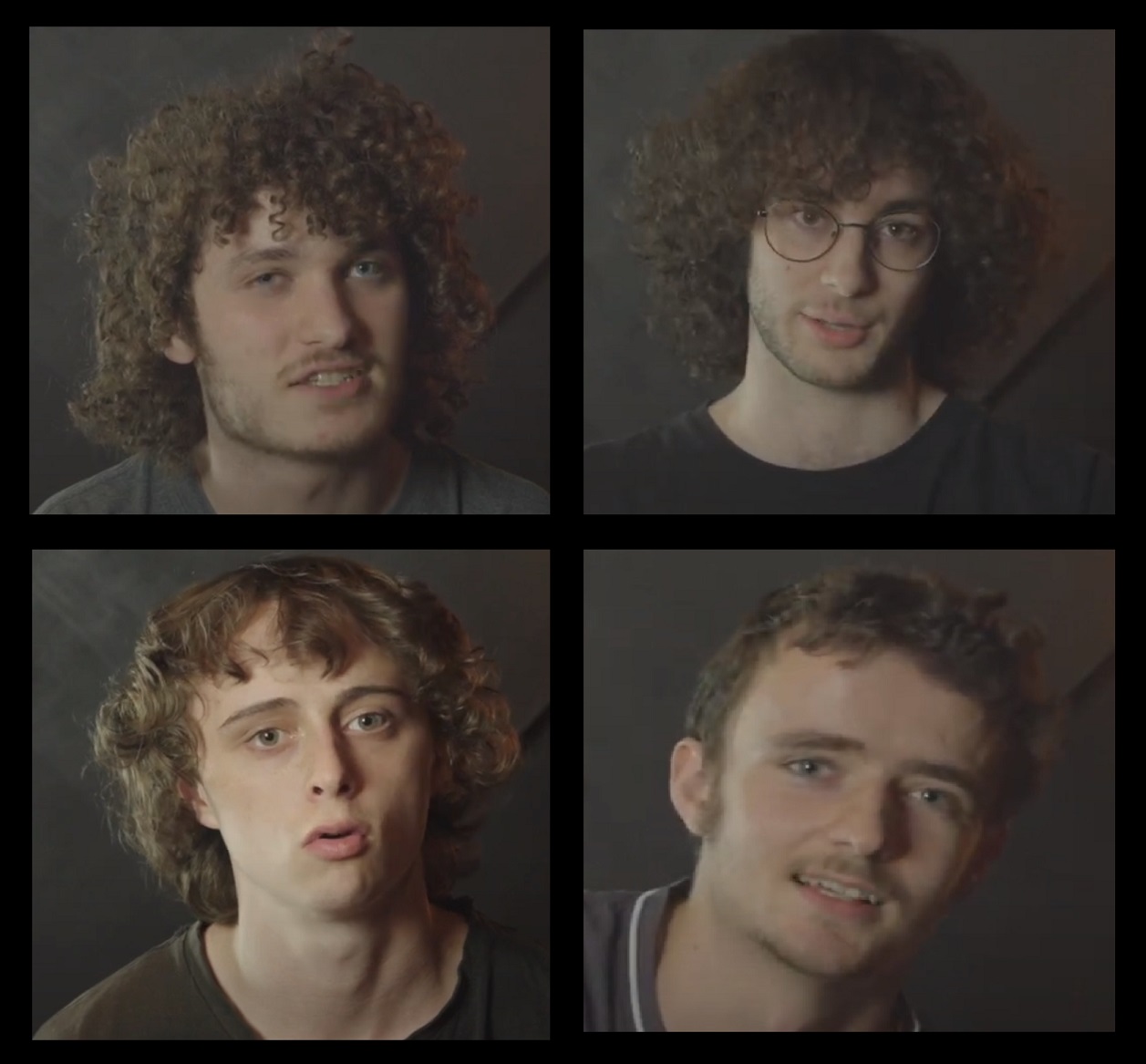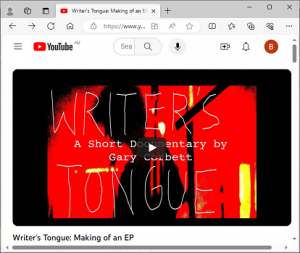So your humble BASEQ editor stumbled upon a group of four very young musicians who left me impressed. It wasn’t their youth, it wasn’t the use of vintage high powered guitar amplifiers played at a very comfortable volume but just dripping with tone. It wasn’t really even the choice of material they were playing.

Michael Georgas (Bass), Peter Donaghy (Drums), Oskar Thaw (Guitar), Buddy Moyes (Guitar, Vocals and Harmonica),
It was the feel of that material. It was the musical communication between the members on stage. It was like that they didn’t just play materials that would have been appropriate coming from the 1960’s Blues Explosion in the U.K., it was like they understood it at an intimate level – got inside the music, past the notes and rhythms – and had been doing it for years. And, at the time, they weren’t even 20.
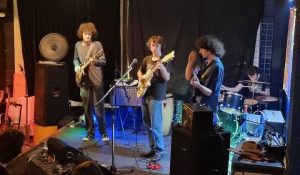
Shade Hadie Playing Live At the Cave Inn 1
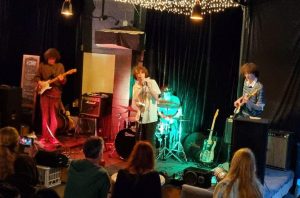
Shade Hadie Playing Live At the Cave Inn 2
That band was then known as “Writers Tongue”, but have now landed on the name Shade Hadie, as a reference to a JJ Cale lyric from Call The Doctor.
Below is a conversation recorded and transcribed mid September, 2023. Also look at a YouTube video of the band recording an EP, mentioned in the interview https://www.youtube.com/watch?v=9WWmHWKqboo
| BASEQ Editor: | Do you wanna give a quick little rundown of how you guys got together and especially with the the recent new member joining? |
| Buddy Moyes | Well, it we all went to Indooroopilly State High School. So we met there, but it started with me and Oscar in grade seven. We first connected through guitar. Both of us had a keen interest in the Blues and then a little later we started playing with Peter on drums and then when you first saw us we were playing with a our last bassist. His name’s Monty Stevenson but now we have Michael on bass. |
| Michael Georgas | Yeah, but I’ve played guitar like on and off for a bit. And then, like pretty recently, like two years ago, I actually like was learning stuff. And then I’ve been friends with these guys for a while now. And then they asked me to be their bassist when Monty left. |
| Buddy Moyes | And yeah, I jumped on that and yeah, we we basically just asked him, would he be OK playing bass because the main thing that was important. Like even if he hadn’t picked up the bass yet, he’s on the same wavelength, and that’s what matters for us is music taste. |
| BASEQ Editor: | It it’s so you’re you’re saying it’s actually the the style of music that have brought you all together very much like the early days of The Rolling Stones, for example.They knew each other, but it was the thing that lifted them and and connected them. |
| Buddy Moyes | Yeah, definitely. And I mean, our creative interest is all very mutual. |
| BASEQ Editor: | OK, so the so that means that everyone feels pretty comfortable playing together and and lots of swapping of ideas. How about when it comes to songwriting? |
| Buddy Moyes | Well, we as a band, have jammed a lot over the years, but actually like coming up with songs has been very recent for us in the last year. We kind of have two different ways to approaching songs and it’s kind of depending on the nature of the song we for our more regimented struction kind of songs are one of us will come up with something. The rest of us will do our magic and kind of just almost like session musicians take a small string of an idea and elaborate it on a lot more and without more kind of loose improvised based jams.It’s pretty much the same, just a lot more spontaneous. One person will come up with a small idea.That’s kind of almost a happy accident when improvising and then the rest will just jump on and start elaborating until we kind of got our own thing going. |
| Peter Donaghy | And especially now with Buddy as well. In the last sort of year or two, he’s been getting into piano, been able to learn something on piano and then put that on onto guitar. And so then the rest of the boys can, uh, play the stuff he’s come up with as well. |
| Buddy Moyes | Yeah, cause with my guitar, it’s just kind of coming up with stuff that me and Oscar could kind of play along and base off. But since I got into piano it it’s made it a lot easier. Kind of thinking more as a band instead of just myself.It’s a lot more of an open instrument when writing things, but. |
| BASEQ Editor: | So would it be safe to to guess that because you’ve got a shared interest in the type and style of music, when you stumble across a good idea, even just through jamming, you instantly recognize it as a good idea because of that shared musical understanding? |
| Buddy Moyes | Yes, like I said, happy accidents. They’ll they’ll usually be like a small, I’d say like a lick or like a drum groove that we kind of all like, look at each other and go. That’s something and we just kinda play it and play it again until it slowly starts getting bigger and bigger and more evolved. |
| BASEQ Editor: | OK, so even though you’ve been together for and and have known each other for actually quite a few years and yet you’re no older than twenty or younger. So, that’s that’s that’s still early days as far as a long career in front of you. |
| Buddy Moyes | In this last year, our second year of playing gigs being introduced to the Blues Association, we found a lot more venues and a lot more people who appreciate our stuff. And it’s kinda open to us because we were very pessimistic for a while about not really having that much faith that the Blues are still kicking but being exposed to venues like the Royal Mail and Cave Inn- has been really, really good. |
| Peter Donaghy | It’s giving us a lot more faith and and just to touch on that we we’ve really it’s been it’s an important thing for us as well to not be playing and at the end of it thinking that we’re gonna get something out of it maybe like money wise or anything we’re we’re we’re just playing for the experience right now especially these first couple of years. Like we need to make some get some revenue out of this, but our revenues, the experience I suppose, yeah. |
| Buddy Moyes | And the main thing that’s just been tricky for us is the social media aspect. Where we’ve only kind of just started recently advertising ourselves on social media. We’ve been pretty lazy with that, so because that’s a lot more important now than it used to be, yeah. |
| BASEQ Editor: | I think everyone’s finding that at the moment, including groups like the the Blues Association as well. So do you keeping in mind that you’re here for the experience and to grow the music and the main driver for this is the music itself, where do you see some part of the future? |
| Buddy Moyes | Hope hopefully to get more and more original work out there, but mainly just to be able to keep doing more and more and more gigs and be able to thrive doing that because it’s very good as a almost as a muscle to keep practicing original work, but at the same time we kind of got to rely on our uh our momentum as a live band to kind of support that and to do it justice.So we really just wanna be able to keep getting more and more gigs and once we’ve kind of gotten more in name of a name out there in Brisbane to expand even more. But yeah, the main thing we just want to be able to keep, keep doing music. |
| BASEQ Editor: | With the developing of original material, is there a desire to actually record that original material and get it out there? |
| (All) | Yeah. Definitely. |
| Buddy Moyes | Generally we just wanna be able to do that, but we’ve also been talking about specifically one big aspiration – we wanna do is record on tape. We wanna get the money and resources to be able to do that because we’re really into the analogue sound. |
| BASEQ Editor: | Using the analogue gear, getting that analogue sound to try and keep it authentic to some of the the roots that inspired you in the first place? |
| Buddy Moyes | 100% yeah, we love that sound, yeah. |
| BASEQ Editor: | Any material, or any songs that you’ve done that you treasure because they’ve got a special resonance with you or a special meeting with you, or they’re from an artist that you regard highly? |
| Michael Georgas | I’d say that’s like many musicians that whoever we cover we regard them highly. So where we think it’s worth covering them and adding our own spin on it, you know? |
| Buddy Moyes | And especially with a lot of those traditional blue songs like that, we’ve done so many of them. We we just love them and we love how open they are that every band’s interpretation of them is completely different. |
| Peter Donaghy | Yeah, it might not necessarily be like the actual meaning of the song, but just the way the song has come about and the way it’s all put together, everything can be in of big inspiration. |
| Buddy Moyes | There’s there’s a couple composers where we kind of just do exactly the same as the studio because they’re just too good like some zapper and Captain Beefheart ones and some Canned Heat. But for a lot of those other ones that we cover, yeah, we keep him really open and just have our own spin on it because it’s just very improvised base. So it becomes natural that like you can’t help but do something different. |
| BASEQ Editor: | And in doing something different, does that mean sometimes you think, well, maybe a set of congas will come in handy here? Or maybe a different sorts of percussion, an ace tambourine player, for example, someone playing a triangle or a kazoo? |
| Buddy Moyes | We’ve got a friend who in the last year, we’ve got to sit on a couple songs in the set, cause he’s he’s really into axillary percussion. Like he’s a drummer, obviously, but he’s really into congas. We’ve obviously gotten him a lot in tambo (Ed: “tambourine”) because a lot of songs need tambourine, but he’s also really into marimba. So yeah, he that’s been really fun. That’s really filled out the sound like a big inspiration of ours is The Allman Brothers Band. They had two drummers. So they had timpani, timbales, just so many different axillary percussions. Same with Tom Waits. We thought at one point about a piano player and organ player, but we just think more percussion is just the perfect thing to, not muddy things up, but to really accentuate that sound. |
| BASEQ Editor: | So so part of it is the actual feel, the groove, getting back to a heartbeat, getting back to back to rhythms. |
| Buddy Moyes | Yeah, we we are all into rhythmic kind of stuff. Yeah, over melody. Honestly, something you’d always pick out in song if you hear some percussion. |
| Peter Donaghy | That’s just sounds crazy cool that you’ll always wanna put some of it into your own, yeah. |
| BASEQ Editor: | So it provides a good inspiration. |
| Buddy Moyes | Our friend Riley Sharp. He’s been playing it a lot more recently. And we’re gonna hopefully get him on even more songs. |
| BASEQ Editor: | As there is there any artist that you’ve found and think people need to know more about but don’t get the attention? |
| Buddy Moyes | He one that comes to mind is he’s gotten a big following more recently and it kind of underground following is Captain Beefheart, but then again, he’s gonna a lot more attention than some other artists. |
| Buddy Moyes | (to the rest of the band) What are other artists that we’re into? |
| Peter Donaghy | Alan Wilson from Canned Heat, He’s just like such a small character in the story of Canned Heat but the band itself has gotten so big. |
| (others agree) | Yeah, Al Wilson |
| Buddy Moyes | He’s the driving force of Canned Heat, and the Blues, and didn’t get much attention. Another huge one is Peter Greens Fleetwood Mac. Because when people here Fleetwood Mac, they go straight to the American, Stevie Nicks, Fleetwood Mac, which involved into after Peter Green left, which is just such such a different sound. And barely any people give much attention to Peter Green and those early 60s to late 60s years of Fleetwood Mac that barely get much attention today. And that’s been such a big influence of ours. |
| BASEQ Editor: | What else is important to the band that you’d like to share? |
| Buddy Moyes | Ohh the gear. Because when we were talking about recording onto tape, it’s to do our gear justice, because for us as electric musicians, the equipment is important. Michael’s got a 73 Fender Bassman, and Oscars got a 1965 Fender showman and I got a 1969 Fender showman. So they’re all tube valve driven gear, all completely analogue. |
| Peter Donaghy | And yeah, we’ve had to do a bit of work to kind of be able to use that because of volume |
| Buddy Moyes | and volume is a huge thing because our our amps are 100 Watt. So they are built for stadiums, so we’ve had to get attenuators (powersoaks) that actually toned down the volume. So we can get that sound and be able to actually play it. And every time we go to get cabs (separate large speaker cabinets … not light to move), but it to us it’s all very worth it. We we love that that tube driven analog sound, yeah. Now a couple, a couple gigs when we bring in these amplifiers They’ve been like, ‘what the hell are you bringing these in for’? Ohh yeah, and then a couple gigs we’ve it’s been absolute overkill, but yeah, since we’ve gotten those attenuators, it’s been a lot better. And we’re also thinking of getting low wattage tube and combos for it to be a lot easier. But yeah, we are very stubborn with that tube sound, yeah. |
| BASEQ Editor: | Committed. Very committed to that sound. Hence, doing everything that you can, including introducing “powersoaks” on the amplifiers to be able to get that sound at a venue appropriate level. |
| Oskar Thaw | It’s a whole other belief we would have to tame. |
| Buddy Moyes | Yeah, 100%, yeah. |
| Michael Georgas | We’ve just finished doing an EP of original work that we still learn, or whether we’re posting that on Spotify or more posting as demos on YouTube? |
| Peter Donaghy | But to start, yeah, as a start and… |
| Buddy Moyes | We kind of … we were real lazy with kinda getting original work out there and until we had this friend of ours who went to SAE who needed to record an album for her assignment because she was doing producing and that was perfect because she asked us, would you guys be keen to do an album and me knowing that we didn’t have any original work, I was just like, yeah.And saw the opportunity to have original work recorded because we knew they would be the perfect motivation for us to actually finally do something. And yeah, that we’ve just finished mastering it. And so we’re just thinking about what to do now, yeah. |
